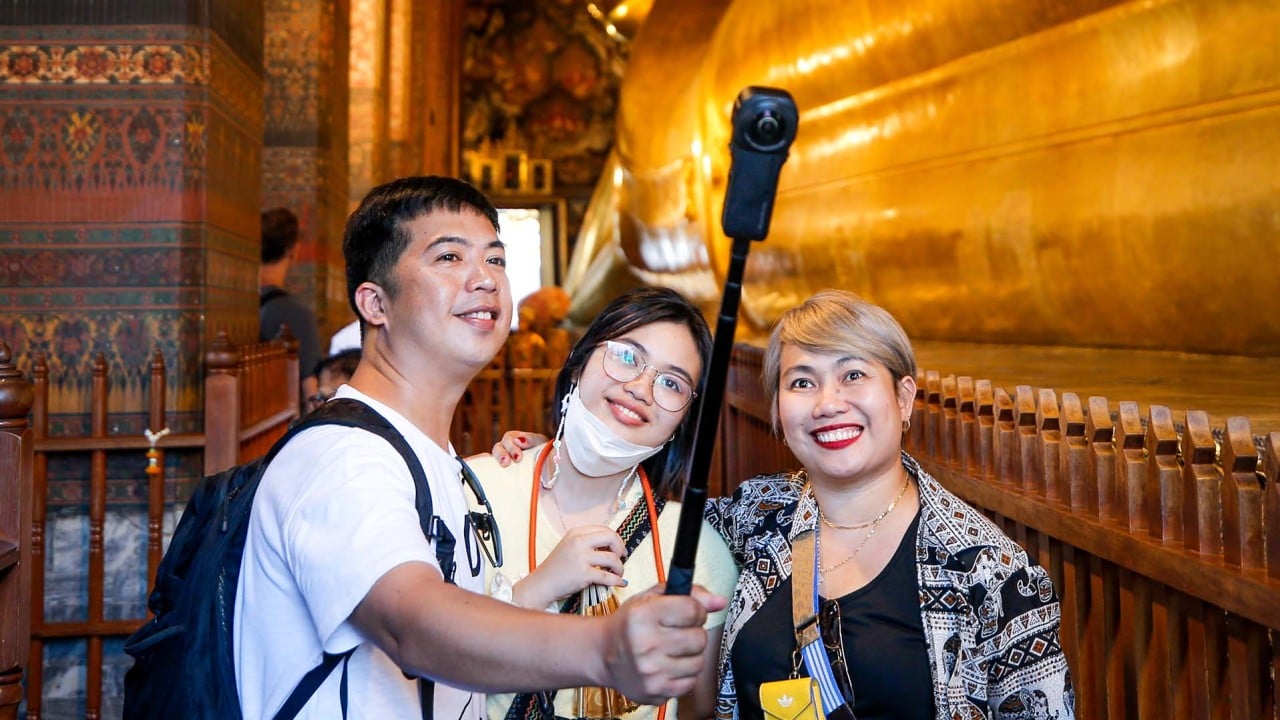
Russians boost Thai tourism and property sales as they flee Ukraine war
- Industry players predict influx of Russians in coming months as they escape the conflict in Ukraine, plan long-term stays in Thailand
- Beyond tourism, Russians are also pouring their cash into Phuket’s property sector in the absence of Chinese tourists
Palawat (not his real name) has owned a hotel on Phuket’s Patong beach for the past 20 years. It was closed down during the pandemic, but the place got back on its feet again months ago thanks to Russians arriving on the Thai resort island.
“I have no funds to renovate my hotel, so I turned it into an apartment building instead,” he said of his 20-room establishment. “Now 90 per cent of the customers are young Russians.”
Palawat thinks Phuket will see a bigger influx of Russians in the months ahead. He recently doubled the rental to 10,000 baht (US$287) a month to take advantage of the island’s popularity among Russians.
Russia tourists back to Thailand using chartered planes, foreign credit cards
“Many young Russians I spoke to have come to Southeast Asia to avoid difficulties, like the military draft, at home. They chose Thailand for the sense of freedom it gives, financially and lifestyle-wise,” Palawat said. “They have a limited budget, but they can stay for as long as six months.”
While international sanctions on the rouble in February saw Russians either stranded or scrambling to leave Thailand as their credit cards or cash became invalidated, by the end of the year the Thai government expects around 310,000 Russians to have visited, with most of them landing in Phuket, Pattaya and Bangkok.
A number of airlines now operate direct flights from Russia to Thailand. Emirates flies from Phuket to both St Petersburg and Moscow. Azur Air operates charter flights between Novosibirsk and U-tapao airport, near Pattaya. Ikar Airlines and Aeroflot have also resumed flights to Thailand.
In January this year 23,760 Russians visited Thailand, the highest among all foreign visitors. Over 55,000 Russians visited Phuket in November, more than double those from India at 26,525, and much more than the few thousand Thais heading to Phuket in the past months.

Malaysians are the biggest group of visitors to Thailand at 1.5 million, followed by Indians at 856,000 and Singaporeans at just under half a million as of early December.
Observers said tourism, which accounts for about 15 per cent of the GDP, could remain Thailand’s sole economic engine for the coming months as exports are hit by global economic uncertainty.
Thailand reached its goal of 10 million visitors this year on December 10 but think tank Kasikorn Research Centre said the country could see as many as 24 million visitors next year, exceeding the government target of 20 million arrivals for 2023, or about half of the pre-Covid figures. The official international tourism revenue target is 1.5 trillion baht or 80 per cent of the record figure in 2019.
Kasikorn, however, warned that tourists’ spending would be curbed by the looming global recession and cost of living crisis. A possible new wave of Covid infections in China as the zero-Covid policy eases could also further delay trips made by mainlanders.
Direct flights help Thailand lure Russian tourists back to its beaches
Despite the challenges, Russians keep pouring money into not only tourism but also Phuket’s property sector.
According to Nasupha Suwansri, a real estate agent in Phuket, Russians have sustained the industry in the absence of Chinese tourists, who are usually the top spenders on properties on the island.
“Since the third quarter, there’s been a surge in Russians choosing to make long-term property deals of between six months and one year in the villa rentals market,” she said. Most of her customers are families who are willing to spend between 80,000 and 200,000 baht a month for a one-year rent of a three-bedroom pool villa.
Russians’ ownership of luxury villas in the mid-range sector, ones priced at 20 million baht upwards, were also rising. Chinese were still the top buyers of new condominiums in Phuket, but only if tallied by the units sold.
“We expect Chinese visitors to return by the second quarter next year,” Nasupha said. “But in terms of spending volume, as opposed to unit volume, the Russians are top property spenders in Phuket currently.”
Thailand’s hospitality group Centara Hotels & Resorts told This Week in Asia that Russia was Thailand’s largest European feeder market pre-Covid and it “has a key role to play in the future of Thai tourism – not only for destinations like Phuket and Pattaya, but for the entire country”.
“It should be noted that Thailand was also a popular destination for Ukrainian visitors, and we hope that conditions will allow our Russian and Ukrainian visitors to return in future,” it said.
“We are tentatively forecasting outbound China travel to recommence in mid-2023 with a recovery from Q3 onwards. Economic problems in Europe, including the cost-of-living crisis, will limit the rebound of this market to around 80 per cent of pre-pandemic levels.
“But we are seeing a strong resurgence from other important markets, most notably India, the Middle East and Asean countries. These markets could easily reach 2019 levels next year.”


